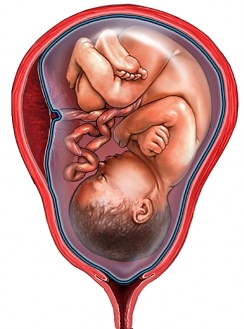

These can be caused by a defect in the shape of the uterus or the development of the amniotic sac, but a bacterial infection can also be the culprit for this condition. Immediate medical attention will be required to determine the cause of this tear. The leak will either appear as a slow trickle or a sudden gush of liquid depending on the severity of the tear. A tear in the amniotic sac will frequently cause this to occur. These typically occur between 37-38 weeks of pregnancy. If a woman is not yet at term, this rupturing of membranes is referred to as a premature rupture of membrane or PROM. This is frequently referred to as a woman's "water breaking" and is a common sign that a woman is going into labor. This is caused at the end of the pregnancy when membranes holding the amniotic fluid rupture, causing a leak. Spontaneous rupture of membranes or SROM is the most common cause. You are not sure what you are experiencing.You notice the flow becoming stronger with time.You have a heavy discharge along with a fever.They are in the best position to confirm if you are really having an amniotic leak. If you suspect you are leaking amniotic fluid, go talk to your doctor as soon as possible. It is a good idea to call your doctor if you are not certain about your situation. Also, you may not be leaking amniotic fluid if it seems thick like mucous, has a urine-like odor, or has a yellow tinge like urine. Some women are likely to experience cramping, but it is usually not that severe. You should talk to your doctor immediately if you notice any brownish or greenish tint to the amniotic fluid.

The fluid is usually clear but you may find white specs and mucus in it. Unlike urine, you cannot control the flow of amniotic fluid.This leaking will continue endlessly once it begins to shed. You will have to change your undergarments regularly because of a steady discharge. Unlike these substances, amniotic fluid is odorless and will soak the undergarments as it leaks in a significant amount.You may also begin to leak urine as the uterus puts additional pressure on the bladder.

During the final trimester the fetus will put increasing amounts of pressure on the body, causing discharge to fall from the cervix. It can be difficult to determine if you are leaking. How Do You Know If You're Leaking Amniotic Fluid? Amniotic fluid will take on different levels of proteins, carbohydrates, phospholipids, lipids and electrolytes as necessary to nourish the growing fetus. This substance begins to form up to two weeks after fertilization. The fluid also acts as a level of cushioning that protects the fetus from harm. The fetus may move about in this fluid, but it limits the wall of the uterus from contracting too tightly around the growing baby. Amniotic fluid is the substance which surrounds the fetus as it grows in the uterus.


 0 kommentar(er)
0 kommentar(er)
